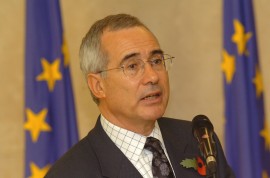
Halloween is the time of year for frightening people, so Sir Nicholas Stern chose the right moment to publish his report on the threat of global warming. He explains that the likely rise in global temperatures arising from current and projected emissions of greenhouse gases may deprive more than a billion people of water, flood a similar number, see millions die from starvation and millions more from malaria, and wipe out 50 per cent of mammal and bird species. The extreme effects “could be catastrophic, but are currently very hard to capture with current models as temperatures would be so far outside human experience.” Frightening indeed, but that isn’t what dominated the news.
It seems that the threat of Pestilence, War, Famine, and Death is not enough to get people interested in climate change. It is only the impending arrival of a fifth horseman, Recession, that draws the attention of the headline writers. Global GDP could fall by 20 per cent. That is the language of modern times.
It is for other bloggers to speculate on what that says about our sense of priorities. I am going to confine myself to chapter 21 of the report, grandly titled “Framework for Understanding International Collective Action for Climate Change” (which you can read here)
Of course, it is nothing of the sort. It is more of a framework for lamenting the absence of such international collective action.
Sir Nicholas is an economist, not a political scientist, and it shows. He starts with a discussion of game theory, which is interesting as a demonstration of the limitations of cooperation without rules rather than as a description of the necessary rules themselves. It is a self-limited way of approaching the problem. He himself notes that:
“Formal multilateral agreements are at one end of a spectrum of co-operation, and can, if commitment is strong or enforcement mechanisms are credible, provide a high degree of assurance that countries will contribute to meeting shared goals.”
Think about that. That means that there is a spectrum of ways in which to fight climate change, and the ways to fight it at one end of the spectrum are better than the ways at the other end. Obviously, we should prefer the end of the spectrum with the better ways. Where is the doubt?
Sir Nicholas goes on to say that:
“Robust, durable frameworks for international co-operation, based on a shared understanding of long-term goals, are required to meet this challenge.”
Quite right, but the experience up until now of international cooperation is rather poor.
For example, it is reported that international concern about climate change dates back to 1979. Governments have been worried about it for 27 years, as if that’s a good thing. But what it really shows is that international agreements deliver nothing if they remain intergovernmental. We’ve not lived through 27 years of concern, but 27 years of inaction despite the concern.
So what is to be done? The clue is in what he says about national governments. Their credibility would be boosted if they pass international commitments into domestic law. That way, it becomes easier to make sure that they do what they say they will do.
But at international level, he settles for something called a “compliance procedure”. No, call it what it is, or rather what it needs to be. Call it law.
The next clue lies in his observation about future uncertainty. He writes that:
“an international regime requires clear goals, and may require some form of adjustment of specific levels of effort to reach those goals over time to allow flexibility to respond to unforeseen circumstances.”
This is important. It is not just a question of setting up a commitment to cut greenhouse gas emissions, but of setting up a system to take decisions about cutting greenhouse gas emissions. We can’t decide everything straightaway: we need a future means of deciding.
Now, the experience of 27 years of inaction does not bode well for intergovernmental decision-making in the future. So what does Sir Nicholas propose?
There needs to be a “competent and credible international process”, which will “build credibility through reputation”. This is important, too. He does not suppose that its credibility should come through legitimacy, through representing citizens or their elected representatives in parliaments. No, they don’t count. The future of the planet will depend on experts, on whom the rest of us will have to rely.
The author is an eminent economist, knighted for his public service, so he would say that, wouldn’t he?
